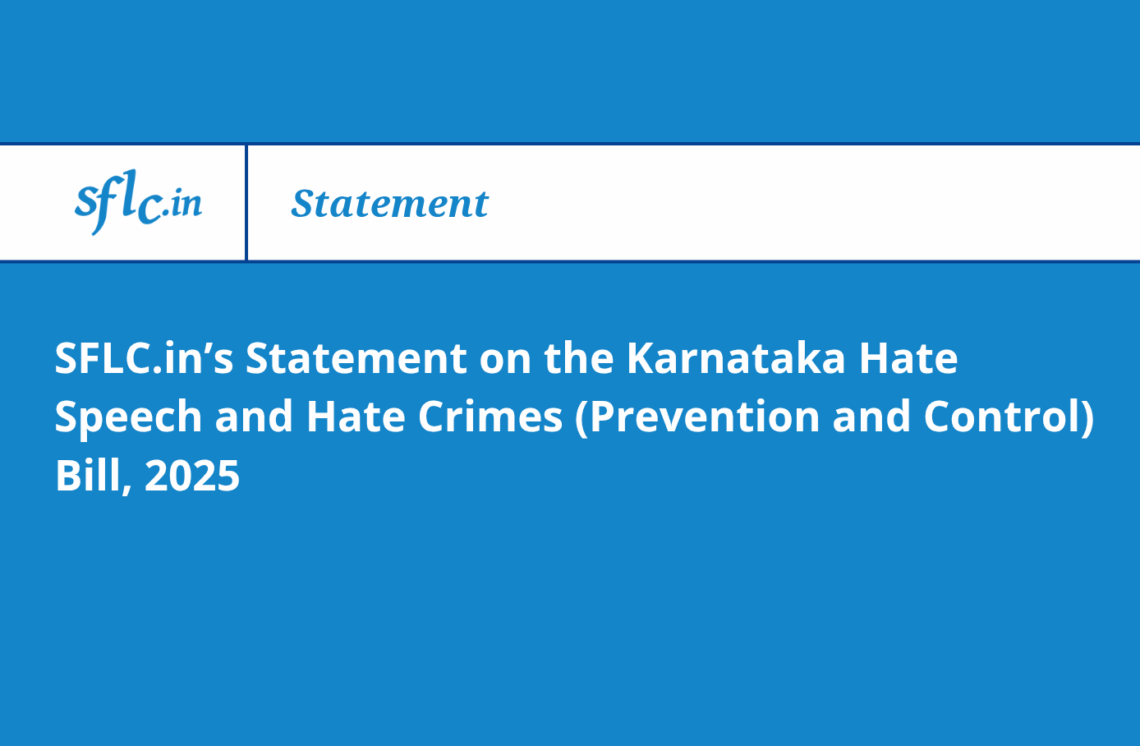SFLC.in’s Statement on the Karnataka Hate Speech and Hate Crimes (Prevention and Control) Bill, 2025
In light of the exponential increase in harmful content, hate speech, and hate crimes in India, the Karnataka State Government has released the Karnataka Hate Speech and Hate Crimes (Prevention and Control) Bill, 2025 (Hate Speech Bill). SFLC.in urges the Government of Karnataka, the Ministry of Information and Broadcasting (“MIB”) and the Ministry of Electronics and Information Technology (“MeitY”) to ensure that the public consultation process for the Karnataka Hate Speech and Hate Crimes (Prevention and Control) Bill, 2025(“the Bill”) will be inclusive, transparent and encourage participation from a diverse group of stakeholders.
The Hate Speech Bill defines the offence of hate speech under Clause 5, as any communication, both online and offline, that could reasonably be construed to demonstrate a clear intention to harm or incite harm or promote or propagate hatred on the basis of religion, race, caste or community, sex, gender, sexual orientation, place of birth, residence, language, disability, or tribe. Communication includes distribution of material, electronic communication, or the display of material that could be defined as hate speech. Further, under Clause 7, aiding, abetting or assisting the commission of hate speech would also be punishable with imprisonment up to 3 years and a fine. Sub-Clause 7(2) goes a step further, and also mentions that intermediaries who provide their platform to commit such offence, shall be punished with imprisonment up to three years, and shall also be liable to fine or both. Under Sub-Clause 7(3) supplying money in support of an act which could constitute hate speech would be punished with imprisonment up to three years, and shall also be liable to fine or both.
The approach taken by the present Bill has the unintended effect of creating a chilling effect on freedom of speech and expression, stifling dissenting voices and compelling platforms to engage in over-censorship. Reference can be made to the judgment laid down in Shreya Singhal vs Union of India, where the Supreme Court struck down Section 66A of the Information Technology Act, 2000. The SC held that Section 66A was a violation of the right to freedom of speech and expression guaranteed under Article 19 (1) as Section 66A was unconstitutionally vague and its intended protection extended beyond the scope of the reasonable restrictions to free speech under Article 19(2) of the Constitution of India. This could result in “a very large amount of protected and innocent speech” being curtailed. The issue with the current Bill too is that the sweep of the legislation is overly broad, and results in the violation of the right to free speech and expression. While well-intentioned, the Bill excessively invades free speech, and criminalizes communication in a vague and arbitrary manner.
Intermediaries and platforms are already regulated under the Information Technology (Intermediary Guidelines and Digital Media Ethics Code) Rules, 2021. If platforms are further criminalized for actions that take place without their knowledge, despite due-diligence undertaken by them, they are liable to engage in over-censorship and curtail free speech further.
SFLC.in urges the Government of Karnataka to reconsider various provisions of the Bill as per the prevailing constitutional law jurisprudence in India. It would be key for the Government to engage with a diverse group of stakeholders to conduct an exhaustive study on the impact of such a law.
We would be obliged to meet and engage in dialogue over such critical issues with the Government of Karnataka.
About SFLC.in
SFLC.in is the first Indian legal services organization that works exclusively on technology, law, and policy. As a not-for-profit organization engaged in the empowerment of Indian citizens of their digital freedom and rights, it operates as a collective bringing together different stakeholders to a common platform to further the cause of digital rights. We promote innovation and open access to knowledge by helping policy makers make informed and just decisions regarding the use and adoption of technology.
Date: July 1, 2025
Download Statement in pdf format here:




